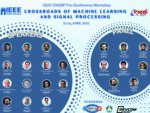Delhi SP/ML Pre-Conference Workshop (Hybrid Mode)
Crossroads of Machine Learning and Signal Processing
3 & 4 April 2025, IIT Delhi, India

OUR SPONSORS



Traditional signal processing techniques often rely on models that accurately depict the system under consideration. However, the complexity and dynamic nature of modern systems limit the effectiveness of these model-based approaches. In this context, machine learning techniques offer data-driven alternatives that do not require explicit prior model information. The proposed pre-ICASSP workshop aims to explore various aspects of learning-based signal processing. Topics will include high-dimensional statistics, quickest detection, sampling theory, online learning, tensor signal processing, stochastic filtering, and multi-agent signal processing and learning.
VENUE AND DATES: This two-day workshop, scheduled for April 03 – 04, 2025 will be held at Aryabhatt Auditorium, Block A, Research and Innovation Park, Indian Institute of Technology, Delhi, preceding the IEEE ICASSP 2025 conference. The technical program will feature 1-2 tutorials and approximately 10-15 research talks by leading researchers from around the world. The workshop is designed to disseminate knowledge, foster idea exchanges, and stimulate new collaborations within the research community. It will differ from ICASSP satellite workshops in Hyderabad in its extended duration and broader scope, promoting cross-domain collaboration.
General Chairs:
Arpan Chattopadhyay
Indian Institute of Technology, Delhi
Kumar Vijay Mishra
US Army Research Laboratory
Steering Committee:
Muralidhar Rangaswamy
US Air Force Research Laboratory
Ananthram Swami
US Army Research Laboratory
Raghu Raj
US Naval Research Laboratory
KVS Hari
Indian Institute of Science, Bengaluru
Finance Chair:
Shobha Sundar Ram
Indraprastha Institute of Information Technology, Delhi
SPS Liaison & Local Arrangements Chair:
Monika Aggarwal
Indian Institute of Technology, Delhi
Registration Chair:
Chandrashekhar Rai
Indian Institute of Technology, Delhi
MS Teams and YouTube Link
Click here for YouTube playlist
The MS Teams and YouTube links for each sessions are provided below:
Day 1 (3rd April) Forenoon:
Day 2 (4th April) Forenoon
|
Day 1: Thursday, 3rd April 2025 |
|
|
Time slot |
Event |
|
09:00 - 09:10 am |
Welcome |
|
09:10 - 9:50 am |
Multiview signal processing using linear and nonlinear canonical correlation analysis |
|
09:50 - 10:30 am |
Copula: From Signal Processing to AI/ML |
|
10:30 - 10:50 am |
Tea Break |
|
10:50 - 11:30 am |
Graph Constructions for Machine Learning Applications: New Insights and Algorithms |
|
11:30 am - 12:10 pm |
Kernel-driven Self-Supervision for Learning over Large-scale Graphs |
|
12:10 - 2:30 pm |
Lunch Break |
|
02:30 - 03:10 pm |
Audio Processing in the Age of LLMs |
|
03:10 - 3:50 pm |
Optimized recalibration for pretrained machine learning models |
|
03:50 - 4:30 pm |
Hierarchical Reinforcement Learning |
|
04:30 - 05:00 pm |
Tea Break |
|
05:00 - 5:40 pm |
ONRG’s Perspectives on AI/ML: Roadmap and Grand Challenges |
|
05:40 - 6:20 pm |
Multimodal Generative AI and Machine Learning |
|
06:20 - 6:30 pm |
Concluding Remarks |
I am text block. Click edit button to change this text. Lorem ipsum dolor sit amet, consectetur adipiscing elit. Ut elit tellus, luctus nec ullamcorper mattis, pulvinar dapibus leo.
|
Day 2: Friday, 4th April 2025 |
|
|
Time |
Event |
|
09:00 - 9:10 am |
Welcome |
|
09:10 - 9:50 am |
Deep Unfolding in Wireless Transceiver Design |
|
09:50 - 10:30 am |
Byzantine-resilient Alternating GD and Minimization (AltGDmin) for Partly-Decoupled Federated Low Rank Matrix Learning |
|
10:30 - 10:50 am |
Tea Break |
|
10:50 - 11:30 am |
Analysis of overfitting and modeling error tradeoff in learning systems using misspecified performance bounds |
|
11:30 am - 12:30 pm |
Poster Session |
|
12:30 pm - 2:30 pm |
Lunch Break |
|
02:30 - 4:00 pm |
[Panel Discussion] Signal Processing and Machine Learning - Opportunities and Challenges |
|
04:00 - 4:20 pm |
Tea Break |
|
04:20 - 5:20 pm |
[Tutorial- Part I] Cognitive Radar - From Adaptation to Inverse Reinforcement Learning |
|
05:20 - 5:30 pm |
Q&A on the Tutorial |
|
05:30 - 6:30 pm |
[Tutorial- Part II] Cognitive Radar - From Adaptation to Inverse Reinforcement Learning |
|
06:30 - 6:50 pm |
Q&A on the Tutorial |
|
06:50 - 7:00 pm |
Concluding Remarks |
